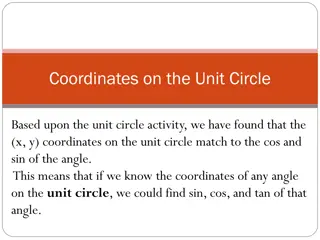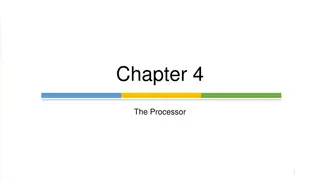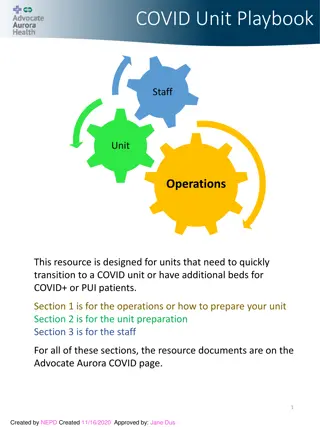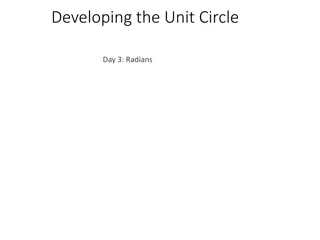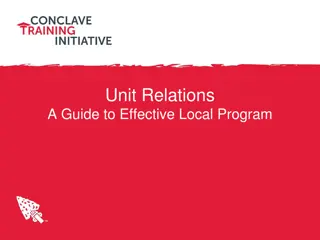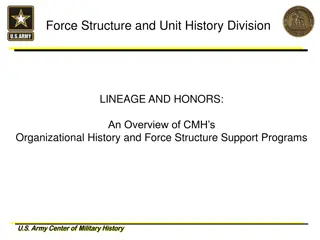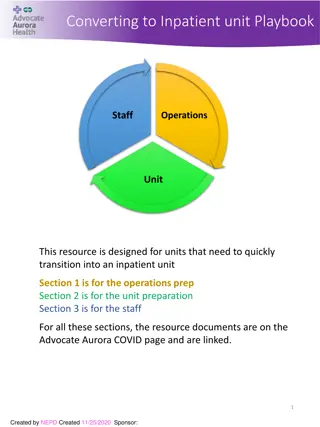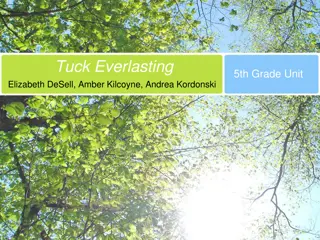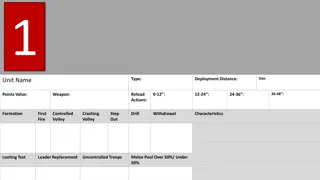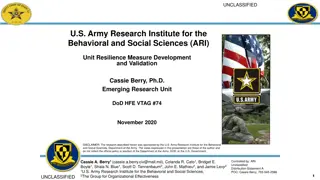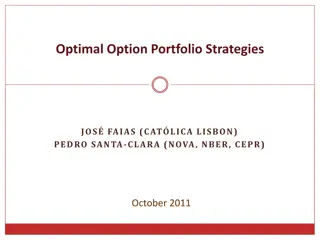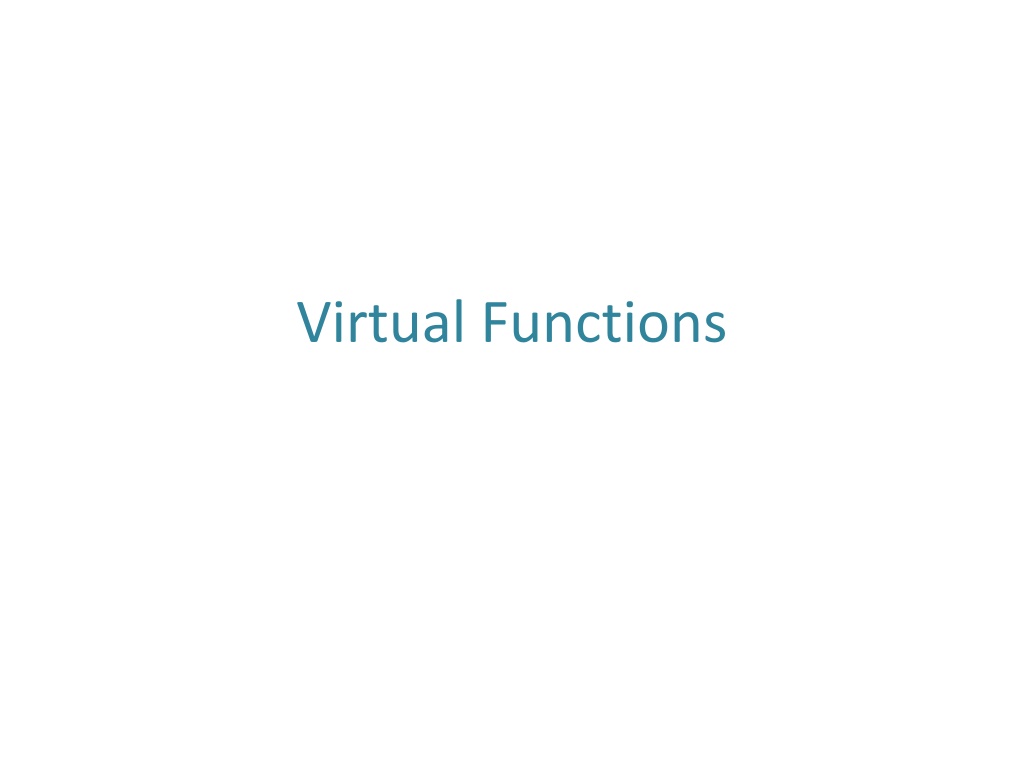
Understanding Early vs. Late Binding in C++ Programming
Dive into the concepts of early and late binding in C++ programming, exploring how binding is crucial for linking identifiers to function addresses. Learn about compile-time and run-time polymorphism, along with practical examples illustrating the difference between the two binding methods.
Download Presentation

Please find below an Image/Link to download the presentation.
The content on the website is provided AS IS for your information and personal use only. It may not be sold, licensed, or shared on other websites without obtaining consent from the author. Download presentation by click this link. If you encounter any issues during the download, it is possible that the publisher has removed the file from their server.
E N D
Presentation Transcript
Binding Binding refers to the process of converting identifiers (such as variable and performance names) into addresses. Binding is done for each variable and functions. For functions, it means that matching the call with the right function definition by the compiler. It takes place either at compile time or at runtime.
Early Binding (compile-time time polymorphism) Compiler (or linker) directly associate an address to the function call. It replaces the call with a machine language instruction that tells the mainframe to leap to the address of the function. By default early binding happens in C++.
Example // CPP Program to illustrate early binding. #include<iostream> using namespace std; int main(void) { Base *bp = new Derived; class Base { public: void show() { cout<<" In Base \n"; } }; // The function call decided at // compile time (compiler sees type // of pointer and calls base class // function. bp->show(); class Derived: public Base { public: void show() { cout<<"In Derived \n"; } }; return 0; } Output: In Base
Late Binding : (Run time polymorphism) In this, the compiler adds code that identifies the kind of object at runtime then matches the call with the right function definition.
// CPP Program to illustrate late binding #include<iostream> using namespace std; int main(void) { Base *bp = new Derived; bp->show(); // RUN-TIME POLYMORPHISM return 0; } class Base { public: virtual void show() { cout<<" In Base \n"; } }; class Derived: public Base { public: void show() { cout<<"In Derived \n"; } }; Output: In Derived
Virtual Function A virtual function is a member function in the base class that we expect to redefine in derived classes. A 'virtual' is a keyword preceding the normal declaration of a function. When the function is made virtual, C++ determines which function is to be invoked at the runtime based on the type of the object pointed by the base class pointer.
A virtual function is a member function which is declared within a base class and is overridden by a derived class. Now, when you refer to a derived class object using a pointer to the base class, you can call a virtual function for that object and execute the derived class s version of that particular function.
Rules of Virtual Function Virtual functions must be members of some class. Virtual functions cannot be static members. They are accessed through object pointers. They can be a friend of another class. A virtual function must be defined in the base class, even though it is not used. The prototypes of a virtual function of the base class and all the derived classes must be identical. If the two functions with the same name but different prototypes, C++ will consider them as the overloaded functions. We cannot have a virtual constructor, but we can have a virtual destructor
#include <iostream> using namespace std; int main() { Derived derived1; class Base { public: virtual void print() { cout << "Base Function" << endl; } }; // pointer of Base type that points to derived1 Base* base1 = &derived1; // calls member function of Derived class base1->print(); class Derived : public Base { public: void print() { cout << "Derived Function" << endl; } }; return 0; } Output: Derived Function Here, we have declared the print() function of Base as virtual. So, this function is overridden even when we use a pointer of Base type that points to the Derived object derived1.
Use of C++ Virtual Functions class Animal { private: string type; ... .. ... public: Animal(): type("Animal") {} ... .. ... }; Suppose class classes Dog and Cat. Suppose each class has a data member named type. Suppose these variables are initialized through their constructors. we have and a base Animal derived respective class Dog : public Animal { private: string type; ... .. ... public: Animal(): type("Dog") {} ... .. ... }; class Cat : public Animal { private: string type; ... .. ... public: Animal(): type("Cat") {} ... .. ... };
Contd.. Now, let us suppose that our program requires us to create two public functions for each class: 1.getType() to return the value of type 2.print() to print the value of type class Animal { ... .. ... public: ... .. ... virtual string getType {...} }; ... .. ... ... .. ... void print(Animal* ani) { We could create both these functions in each class separately and override them, which will be long and tedious. Or we could make getType() virtual in the Animal class, then create a single, separate print() function that accepts a pointer of Animal type as its argument. cout << "Animal: " << ani->getType() << endl; } This will make the code shorter, cleaner, and less repetitive. We can then use this single function to override the virtual function.
// C++ program to demonstrate the use of virtual function class Dog : public Animal { private: string type; #include <iostream> #include <string> using namespace std; public: // constructor to initialize type Dog() : type("Dog") {} class Animal { private: string type; string getType() override { return type; } }; public: // constructor to initialize type Animal() : type("Animal") {} // declare virtual function virtual string getType() { return type; } };
class Cat : public Animal { private: string type; int main() { Animal* animal1 = new Animal(); Animal* dog1 = new Dog(); Animal* cat1 = new Cat(); public: // constructor to initialize type Cat() : type("Cat") {} print(animal1); print(dog1); print(cat1); string getType() override { return type; } }; return 0; } Output Animal: Animal Animal: Dog Animal: Cat void print(Animal* ani) { cout << "Animal: " << ani->getType() << endl; }
Example Explanation Here, we have used the virtual function getType() and an Animal pointer ani in order to avoid repeating the print() function in every class. void print(Animal* ani) { cout << "Animal: " << ani->getType() << endl; } In main(), we have created 3 Animal pointers to dynamically create objects of Animal, Dog and Cat classes. // dynamically create objects using Animal pointers Animal* animal1 = new Animal(); Animal* dog1 = new Dog(); Animal* cat1 = new Cat();
Contd.. We then call the print() function using these pointers: 1.When print(animal1) is called, the pointer points to an Animal object. So, the virtual function in Animal class is executed inside of print(). 2.When print(dog1) is called, the pointer points to a Dog object. So, the virtual function is overridden and the function of Dog is executed inside of print(). 3.When print(cat1) is called, the pointer points to a Cat object. So, the virtual function is overridden and the function of Cat is executed inside of print().
Consider the code below: #include <iostream> using namespace std; class Base { public: void print() { cout<< Hello ; } }; int main() { Derived derived1; Base* base1 = &derived1; // calls function of Base class base1->print(); class Derived : public Base { public: void print() { cout<< hi ; } }; return 0; } Output: Hello Later, if we create a pointer of Base type to point to an object of Derived class and call the print() function, it calls the print() function of the Base class. In other words, the member function of Base is not overridden.
In order to avoid this, we declare the print() function of the Base class as virtual by using the virtual keyword. class Base { public: virtual void print() { // code } };
Consider the code below: #include <iostream> using namespace std; class Base { public: virtual void print() { cout<< Hello ; } }; int main() { Derived derived1; Base* base1 = &derived1; // calls function of derived class base1->print(); return 0; } class Derived : public Base { public: void print() { cout<< hi ; } }; Output: hi
#include <iostream> using namespace std; class A{ public: virtual void display() { cout << "Base class is invoked"<<endl; } }; class B:public A { public: void display() { cout << "Derived Class is invoked"<<endl; } }; int main() { A* a; //pointer of base class B b; //object of derived class a = &b; a->display(); //Late Binding occurs } Output: Derived Class is invoked
Pure Virtual Function A virtual function is not used for performing any task. It only serves as a placeholder. When the function has no definition, such function is known as "do- nothing" function. The "do-nothing" function is known as a pure virtual function. A pure virtual function is a function declared in the base class that has no definition relative to the base class. A class containing the pure virtual function cannot be used to declare the objects of its own, such classes are known as abstract base classes. The main objective of the base class is to provide the traits to the derived classes and to create the base pointer used for achieving the runtime polymorphism.
Pure virtual function can be defined as: virtual void display() = 0;
#include <iostream> using namespace std; class Base { public: virtual void show() = 0; }; class Derived : public Base { public: void show() { std::cout << "Derived class is derived from the base class." << std::endl; } }; int main() { Base *bptr; //Base b; Derived d; bptr = &d; bptr->show(); return 0; } Output: Derived class is derived from the base class. In this example, the base class contains the pure virtual function. Therefore, the base class is an abstract base class. We cannot create the object of the base class.
Compile-Time VS Runtime Behavior of Virtual Functions in C++ A virtual function in C++ exhibits two different types of behavior: compile- time and runtime Runtime behavior Compile-time behavior Alternative name Early binding Late binding Depending on the location where the pointer is pointing How is it achieved The type of pointer
//Consider the example below to understand the behavior of virtual functions better. class derived : public base { public: #include <iostream> void show(){ using namespace std; cout << "show derived class" << endl; class base { } public: void print(){ virtual void show(){ cout << "print derived class" << endl; cout << "show base class" << endl; } } void print(){ }; cout << "print base class" << endl; } };
int main(){ Output: base* bpointr; show derived class derived dev; print base class bpointr = &dev; // runtime binding bpointr->show(); // compile time binding bpointr->print(); }
Abstract Class Pure Virtual Functions Pure virtual functions are used if a function doesn't have any use in the base class but the function must be implemented by all its derived classes Let's take an example, Suppose, we have derived Triangle, Square and Circle classes from the Shape class, and we want to calculate the area of all these shapes. In this case, we can create a pure virtual function named calculateArea() in the Shape. Since it's a pure virtual function, all derived classes Triangle, Square and Circle must include the calculateArea() function with implementation. A pure virtual function doesn't have the function body and it must end with = 0. For example,
Syntax: class Shape { public: // creating a pure virtual function virtual void calculateArea() = 0; }; Note: The = 0 syntax doesn't mean we are assigning 0 to the function. It's just the way we define pure virtual functions.
A class that contains a pure virtual function is known as an abstract class. In the previous example, the class Shape is an abstract class. We cannot create objects of an abstract class. However, we can derive classes from them, and use their data members and member functions (except pure virtual functions).
// C++ program to calculate the area of a square and a circle #include <iostream> using namespace std; // Derived class class Square : public Shape { public: float calculateArea() { return dimension * dimension; } }; // Abstract class class Shape { protected: float dimension; public: void getDimension() { cin >> dimension; } // Derived class class Circle : public Shape { public: float calculateArea() { return 3.14 * dimension * dimension; } }; // pure virtual Function virtual float calculateArea() = 0; };
int main() { Square square; Circle circle; Output: Enter the length of the square: 4 cout << "Enter the length of the square: "; square.getDimension(); cout << "Area of square: " << square.calculateArea() << endl; Area of square: 16 Enter radius of the circle: 2 cout << "\nEnter radius of the circle: "; circle.getDimension(); cout << "Area of circle: " << circle.calculateArea() << endl; Area of circle: 12.56 return 0; } In this program, virtual float calculateArea() = 0; inside the Shape class is a pure virtual function. That's why we must provide the implementation of calculateArea() in both of our derived classes, or else we will get an error.

